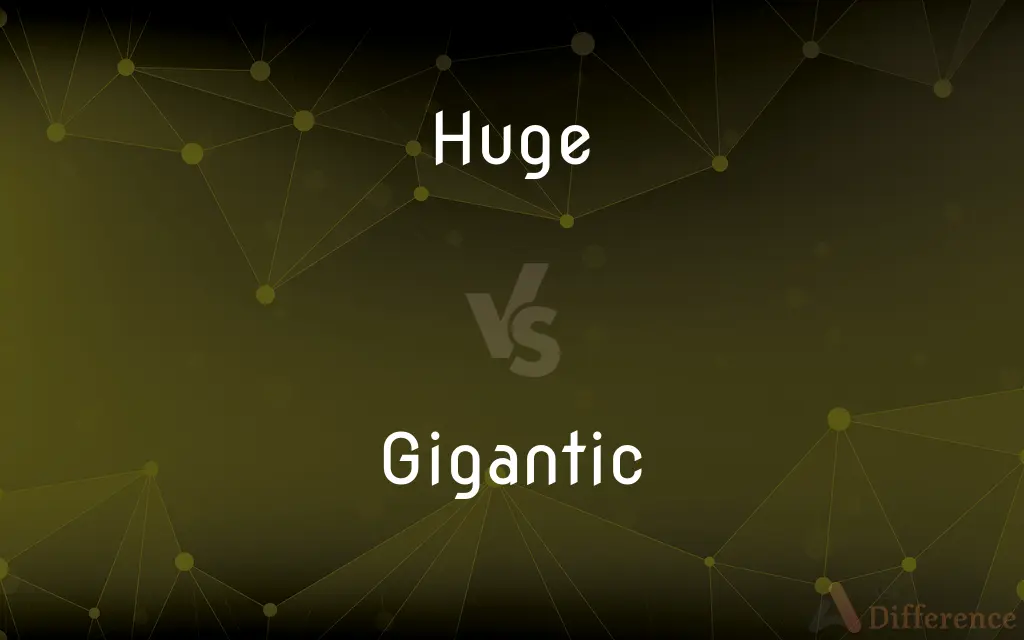Huge vs. Gigantic — What's the Difference?
By Fiza Rafique & Urooj Arif — Updated on April 3, 2024
Huge refers to something very large in size, scope, or extent, while gigantic emphasizes an extraordinary or remarkable size, often beyond huge in scale.

Difference Between Huge and Gigantic
Table of Contents
ADVERTISEMENT
Key Differences
Huge signifies a very large size or extent that is noticeably above average, but within a scale of commonly encountered magnitudes. It's often used to describe things that are big but somewhat familiar in their bigness. Whereas gigantic goes a step further, denoting a size or scale that is exceptionally large, often surpassing usual limits or expectations. It implies a magnitude that is not only large but also extraordinary and remarkable.
When discussing physical objects, something huge is understood to be very large compared to other items of its kind, suggesting a significant departure from the norm. On the other hand, describing something as gigantic often evokes imagery of legendary or mythic proportions, suggesting it is far larger than typical large objects.
In literature and speech, "huge" is versatile, fitting into many contexts without seeming exaggerated. It conveys a sense of largeness that is impressive yet conceivable. Gigantic, however, carries a heavier impact, reserved for when the speaker wants to emphasize the awe-inspiring nature of an object's or entity's size.
Huge can also imply a significant impact or importance, not just physical size. For example, a huge decision. Gigantic, while it can also be used metaphorically, more commonly retains its focus on sheer physical dimension or scale.
In everyday usage, people might describe a large meal as huge, or a spacious house as huge, indicating that while these are larger than normal, they are still within the realm of the everyday. Gigantic, by contrast, might be used for the extraordinary, like a gigantic statue or a gigantic leap in technology, suggesting a scale or impact that is much more dramatic.
ADVERTISEMENT
Comparison Chart
Definition
Very large in size, scope, or extent.
Exceptionally large, often beyond usual limits or expectations.
Connotation
Significantly larger than average but conceivable.
Remarkably large, often to a legendary or mythic degree.
Usage Context
Versatile, fits into many contexts.
More impactful, emphasizing awe-inspiring size.
Metaphorical Use
Can imply significant impact or importance.
More commonly focuses on physical dimensions.
Examples in Everyday Language
Large meals, spacious houses.
Giant statues, leaps in technology.
Compare with Definitions
Huge
Substantial in amount or extent.
They made a huge profit last quarter.
Gigantic
Exceeding the usual or expected size, very large.
A gigantic statue dominated the square.
Huge
Very large in size.
The huge elephant towered over the fence.
Gigantic
Of an extraordinarily large magnitude.
The project was of gigantic proportions.
Huge
Significant in impact or effect.
The scandal had a huge impact on his career.
Gigantic
Mythically or legendarily large.
The hero fought a gigantic monster.
Huge
Considerably above average in scope or degree.
She felt a huge sense of relief.
Gigantic
Emphasizing a dramatic degree of largeness.
The event had a gigantic turnout.
Huge
Great in importance or significance.
It was a huge milestone for the company.
Gigantic
Remarkable in extent, scope, or effect.
They faced gigantic challenges.
Huge
Of exceedingly great size, extent, or quantity.
Gigantic
Exceedingly large in size, extent, or amount, especially for its kind
A gigantic toadstool.
Huge
Of exceedingly great scope or nature
The huge influence of the Hellenic world.
Gigantic
Very great in scope or importance
A gigantic mistake.
Huge
(Informal) Contributing in a major way to success; very important
The defensive line was huge in the second half.
Gigantic
Very large.
Huge
Very large.
Gigantic
(slang) Excellent; very good or exciting.
This band is going to be gigantic.
Huge
(informal) Very strong, powerful, or dedicated.
Both of my parents are huge supporters of animal rights.
Gigantic
In the manner of a giant. en
Huge
(informal) Very interesting, significant, or popular.
The band's next album is going to be huge.
In our league our coach is huge!
Gigantic
Of extraordinary size; like a giant.
Huge
Very large; enormous; immense; excessive; - used esp. of material bulk, but often of qualities, extent, etc.; as, a huge ox; a huge space; a huge difference.
Doth it not flow as hugely as the sea.
Gigantic
Such as a giant might use, make, or cause; immense; tremendous; extraordinarly; as, gigantic deeds; gigantic wickedness.
When descends on the AtlanticThe giganticStrom wind of the equinox.
Huge
Unusually great in size or amount or degree or especially extent or scope;
Huge government spending
Huge country estates
Huge popular demand for higher education
A huge wave
The Los Angeles aqueduct winds like an immense snake along the base of the mountains
Immense numbers of birds
At vast (or immense) expense
The vast reaches of outer space
The vast accumulation of knowledge...which we call civilization
Gigantic
So exceedingly large or extensive as to suggest a giant or mammoth;
A gigantic redwood
Gigantic disappointment
A mammoth ship
A mammoth multinational corporation
Common Curiosities
What makes something huge?
Something is considered huge when it significantly exceeds the average size, scope, or extent.
What makes something gigantic?
Something is considered gigantic when it is exceptionally large, often to a degree that surpasses normal expectations or limits.
Is gigantic always about physical size?
Primarily, yes, but it can also refer to the scale or magnitude of an endeavor or challenge.
How do I decide whether to use huge or gigantic?
Consider the degree of emphasis you want to convey. Use "gigantic" for an extraordinary level of size or impact and "huge" for a very large but less extreme degree.
What kind of imagery does gigantic evoke?
It evokes imagery of legendary, mythic proportions, or anything remarkably large.
Can huge have a metaphorical meaning?
Yes, it can signify importance, impact, or degree, not just physical size.
Can the terms huge and gigantic be used interchangeably?
While they can be used interchangeably in some contexts, "gigantic" often conveys a greater extent of size or impact than "huge."
Is it appropriate to describe emotional reactions as huge or gigantic?
"Huge" is more commonly used for emotional reactions, indicating a significant degree. "Gigantic" is less common in this context, as it emphasizes physical dimensions.
Can a problem be described as gigantic?
Yes, indicating that it is of an extraordinarily large scale or magnitude.
Can a small object be described as huge or gigantic in any context?
Metaphorically, yes, especially if its impact or significance is considerably larger than its physical size suggests.
How does culture influence the perception of what is considered huge or gigantic?
Cultural context and personal experience shape our understanding of scale, so perceptions of what constitutes "huge" or "gigantic" can vary widely.
Are there things that can be described as huge but not gigantic?
Yes, if they are significantly larger than average but not to an extraordinary or legendary extent.
Can the significance of an event be described as huge or gigantic?
Yes, both terms can describe the significance of an event, with "gigantic" indicating a higher degree of impact or importance.
How do huge and gigantic differ in their emotional connotation?
"Huge" often conveys significance or importance, while "gigantic" emphasizes awe and amazement at the size or scale.
Are huge and gigantic relative or absolute terms?
They are relative terms, dependent on comparison to average sizes or expectations within a given context.
Share Your Discovery

Previous Comparison
Contingent vs. Necessary
Next Comparison
Fix vs. PatchAuthor Spotlight
Written by
Fiza RafiqueFiza Rafique is a skilled content writer at AskDifference.com, where she meticulously refines and enhances written pieces. Drawing from her vast editorial expertise, Fiza ensures clarity, accuracy, and precision in every article. Passionate about language, she continually seeks to elevate the quality of content for readers worldwide.
Co-written by
Urooj ArifUrooj is a skilled content writer at Ask Difference, known for her exceptional ability to simplify complex topics into engaging and informative content. With a passion for research and a flair for clear, concise writing, she consistently delivers articles that resonate with our diverse audience.















































